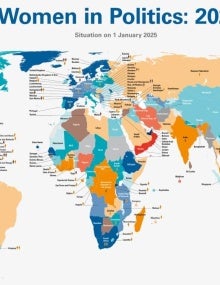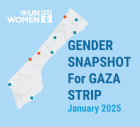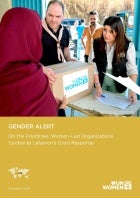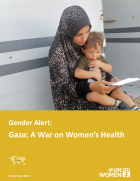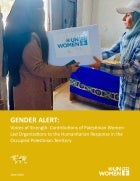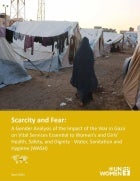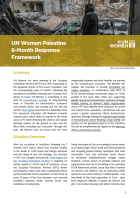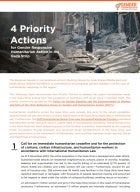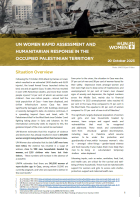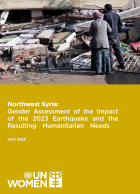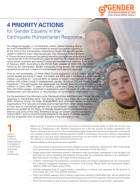1 - 20 of 22 Results
Pagination
Date:
These shocking statistics underscore the magnitude of suffering and the urgent need for global support to protect and empower women in Gaza.
Date:
Driven by the intensifying conflict, the recent escalating humanitarian crisis in Lebanon, has taken a profound toll on people’s lives. On the frontlines of the crisis response, women-led organizations (WLOs) are delivering critical, life-saving humanitarian assistance to affected populations, including women and girls in need.
Date:
The UN Women report Gaza: A War on Women’s Health reveals the devastating impact of Gaza's ongoing conflict on women’s health. With health facilities destroyed and thousands of women unable to access critical care, the report highlights urgent needs in maternal health, cancer treatment, and mental health support. It calls for immediate action to protect health workers, restore medical services, and prioritize the health of women and girls during the crisis.
Date:
The war on Gaza has become one of the world’s most brutal man-made humanitarian crises. The war has directly impacted more than 2.2 million people, resulting in an unprecedented number of civilians killed, alongside overwhelming displacement.
Date:
As the war on Gaza reached its six-month mark, it continues to be a war on women. According to UN Women estimates, more than 10,000 women have been killed to date, among them an estimated 6,000 women who left 19,000 orphan children behind.
Date:
UN Women has been documenting the experiences of women in Gaza in a series of gender alerts that look at various aspects of how the war is impacting the daily lives of women and girls, including food, water, shelter, health, and protection. This new alert focuses on water, sanitation, and hygiene (WASH) services, which are integral to women’s health, dignity, safety, and privacy.
Date:
This document provides an overview of the situation in Gaza and articulates UN Women’s work as part of its six-month multisectoral response to the crisis.
Date:
Following the escalation of hostilities after the 7 October 2023 Hamas attack on Israel, UN Women is responding in line with its humanitarian strategy, its long-standing work in Palestine on humanitarian assistance and women, peace, and security, and the UN and partner Flash Appeal launched on 6 November 2023.
Advocacy Note: 4 Priority Actions for Gender Equality in the Humanitarian Response in the Gaza Strip
Date:
The Regional Gender in Humanitarian Action Working Group for Arab States/Middle East and North Africa (RGiHA – AS/MENA) is committed to ensuring that gender equality is at the core of humanitarian responses in the region.
Date:
Following the 7 October 2023 attack by Hamas on Israel, which resulted in an estimated 1,300 deaths and 4,500 injuries, the Israeli Armed Forces launched strikes by land, sea, and air against Gaza.
Date:
A series of powerful earthquakes measuring 7.7 on the Richter scale struck southern Turkey and northern Syria on February 6th, resulting in widespread devastation. The epicenter was near the Turkey-Syria border, and the region has experienced over 1,206 aftershocks. The impact of the earthquake has been particularly severe in Aleppo, Hama, Idleb, and Lattakia Governorates, worsening the existing dire humanitarian situation.
Date:
Gender Equality in the Earthquake Humanitarian Response for North West Syria
Date:
This newsletter captures the latest updates on the implementation of the Women’s Peace and Humanitarian Fund (WPHF) in Lebanon. The newsletter includes the key highlights and achievements of the WPHF programme partners' towards enhancing women’s participation in the Beirut Port Explosion’s response and recovery process.
Date:
This newsletter captures the latest updates on the implementation of the Women’s Peace and Humanitarian Fund (WPHF) in Lebanon. The newsletter includes the key highlights and achievements of the WPHF programme partners' towards enhancing women’s participation in the Beirut Port Explosion’s response and recovery process.
Date:
UN Women and OCHA jointly examine the extent to which issues of gender equality were factored into various stages of the 2020 Flash Appeal in response to the Beirut port explosions.
Date:
This report presents the results of the independent evaluation of UN Women’s ‘Strengthening the Resilience of Syrian Women and Girls and Host Communities’ (“Madad”) programme and offers lessons and recommendations for future programming on gender equality and women’s empowerment. The Synthesis report includes country specific annexes for Iraq, Jordan and Turkey.
Date:
Marking the 20th anniversary of UN Security Council Resolution (UNSCR) 1325 (2000), UN Women, Wilton Park, the Elders and the UK Foreign, Commonwealth and Development Office, with support from the Government of Germany, convened a high level virtual conference that brought together over 60 experienced peace practitioners, policy makers, women peacebuilders from the region and other regions and multilateral officials to discuss opportunities and challenges for women’s meaningful inclusion in peace processes in the Arab world. The report outlines key points raised by participants throughout the virtual convening, as well as recommendations to enhance women’s inclusion in mediation and conflict resolution processes in the region.
Date:
This guidance note seeks to assist policy and programme actors to conduct rapid assessments that are fully responsive to gender and intersectionality. It is focused on three critical steps: the development of assessment surveys/questionnaires, their implementation, the analysis of findings and resulting recommendations.
Date:
This document outlines UN Women’s response plan for the 2020 Beirut Plan – a plan that works across the humanitarian-development-peace and security nexus to provide immediate relief to those in need, and to ensure that longer term recovery and reconstruction both addresses the needs of women and girls, and promotes gender equality.
Date:
This brief addresses the importance of women’s full, equal, and meaningful participation to an effective pandemic response and to peacemaking efforts, and how the women, peace and security agenda can provide a critical framework for inclusive decision-making and sustainable solutions. It also provides preliminary analysis of the impact of COVID-19 on women’s participation in ceasefires and peace processes and offers a series of recommendations, including on “building back better”.
